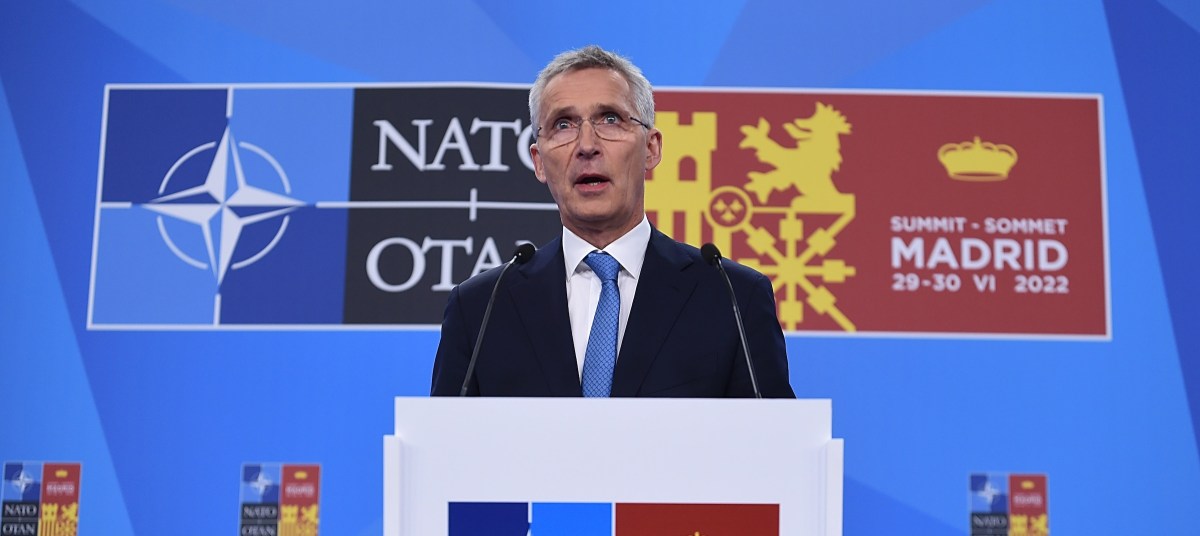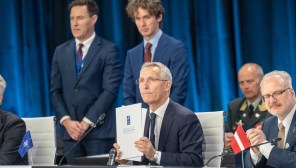NATO unveils new Strategic Concept, pledges support for new ‘defense innovation accelerator’

NATO released its new Strategic Concept on Wednesday, and leaders are expected to offer pledges to establish a new “Defense Innovation Accelerator” for the North Atlantic.
The need for more focus and investment in emerging technology is a major theme of this week’s NATO Summit in Madrid, which President Biden is attending along with his European counterparts.
The innovation accelerator “will support NATO’s efforts to boost interoperability and ensure that every Ally has access to cutting-edge technological solutions for military needs,” according to a White House fact sheet released Wednesday.
The United States will contribute to the initiative by facilitating access to U.S. test centers and other technology “accelerator sites” in the “extensive and diverse U.S. innovation sector,” it said.
The military alliance is also launching a new innovation fund that will invest 1 billion Euros in startups and other organizations developing “dual-use” emerging technologies such as artificial intelligence, NATO Secretary General Jens Stoltenberg said Wednesday during a press conference.
Together with the new innovation accelerator, the fund will help the alliance “harness the best new technology for transatlantic security,” he said.
NATO’s new Strategic Concept, released Wednesday, states: “Emerging and disruptive technologies bring both opportunities and risks. They are altering the character of conflict, acquiring greater strategic importance and becoming key arenas of global competition. Technological primacy increasingly influences success on the battlefield.”
Plans also call for enhancing cybersecurity.
“Building on last year’s adoption of a new Cyber Defense Policy for NATO, Allied leaders will endorse a new action plan to strengthen cyber cooperation across the political, military, and technical levels,” the White House said. “As an operational domain for NATO, cyber will also be a key component of NATO’s strengthened deterrence and defense posture. Building on lessons learned from the conflict in Ukraine, Allies will decide at the Summit to use NATO as a coordination platform for offering national assets to build and exercise a virtual rapid response cyber capability to respond to a serious cyber-attack. The United States will offer robust national capabilities as part of this support network.”
Cyberspace is now “contested at all times,” the Strategic Concept stated.
“Malign actors seek to degrade our critical infrastructure, interfere with our government services, extract intelligence, steal intellectual property and impede our military activities,” it said. The alliance intends to expedite its “digital transformation,” adapt the NATO Command Structure for the “information age” and enhance its cyber defenses, networks and infrastructure.
“We will work together to adopt and integrate new technologies, cooperate with the private sector, protect our innovation ecosystems, shape standards and commit to principles of responsible use that reflect our democratic values and human rights,” the document said.
The new Strategic Concept — the first update in more than a decade — also focuses on space as a key technology area and warfighting domain.
“We will enhance our ability to operate effectively in space and cyberspace to prevent, detect, counter and respond to the full spectrum of threats, using all available tools,” it said, noting that “a single or cumulative set of malicious cyber activities; or hostile operations to, from, or within space; could reach the level of armed attack and could lead the North Atlantic Council to invoke Article 5 of the North Atlantic Treaty” and trigger collective defense responses that could include armed conflict.
The alliance also intends to boost the resilience of its space and cyber capabilities which are at risk of being attacked.
Notably, the new Strategic Concept specifically mentions China as a security concern — a departure from the previous version — in addition to Russia and other perceived threats.
“The People’s Republic of China’s (PRC) stated ambitions and coercive policies challenge our interests, security and values. The PRC employs a broad range of political, economic and military tools to increase its global footprint and project power, while remaining opaque about its strategy, intentions and military build-up,” it said.
“We remain open to constructive engagement with the PRC, including to build reciprocal transparency, with a view to safeguarding the Alliance’s security interests,” it continued.
However, “we will work together responsibly, as Allies, to address the systemic challenges posed by the PRC to Euro-Atlantic security and ensure NATO’s enduring ability to guarantee the defense and security of Allies,” it added. “We will boost our shared awareness, enhance our resilience and preparedness, and protect against the PRC’s coercive tactics and efforts to divide the Alliance. We will stand up for our shared values and the rules-based international order, including freedom of navigation.”




